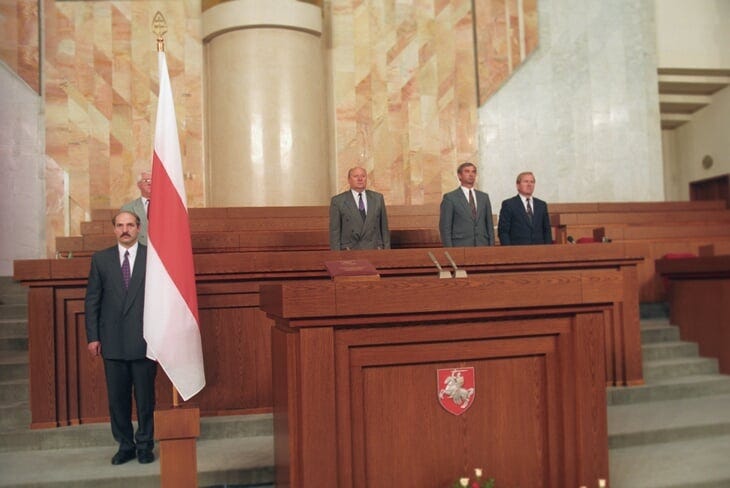I. Who is Alexander Lukashenko Really?
Murky beginnings, a self-styled "Zmagar", and an almost-failed strongman state!
I’ve written about Lukashenko before in passing, and almost always positively. When comparing him to Putin, Luka does come off as a true crusader for truth and justice and all the good things against all of the bad. Even more so when compared to the ethnic psychopaths in power all over Ukraine. But I always knew that further investigation would eventually be necessary, even though I held off on doing it because I knew of the intense distress that it would cause some of my readers. People need to believe in someone or something and they don’t take kindly to having their political idols undermined. I will try to be as gentle and even-handed as possible when dealing with the material though.
First, let me soften the blow by pointing out the good stuff associated with Luka, which you’ve probably heard of already.
The Good That Lukasheko Did For Belarus
Yes, Belarus is far better run than all of the countries that surround it. It is cleaner, less dilapidated, and its citizens are far more put-together and healthy. This is visibly noticeable as soon as you cross the border from Russia. Visitors always remark on these qualities with amazement. The cities are the cleanest I’ve ever seen in all the 50+ countries that I’ve visited in the world. And I lived in Belarus for more than a year.
I was pleasantly surprised by the quality of the local food there. Belarussian agricultural products are a byword for “quality” in the FSU. There are special Belarussian shops in Russia and they used to be in Ukraine too that offered imported Belarussian wares. I would always exclusively shop there if I could.
Tangent: the EU also doesn’t allow the import of Belarussian products because they don’t meet the rigorous health requirements. That just means that they fear the competition and simply won’t issue the certifications. I know this personally because I tried to set up a business exporting Belarussian goods abroad and it was impossible unless they were laundered through Finland first. There is no such thing as “free trade” in this world; all trade is controlled and approved or denied at a committee level somewhere. Yes, you’re allowed to import Chinese junk from pre-approved factories into the West, no problem, and many drop-shippers have made their fortunes doing so. Try to do the same with FSU goods and you simply cannot get it across. Not legally anyway.
Belarus also has other domestic industries like furniture and even some textiles.
This is only possible because of the government not selling off all of their factories to Western investors who then chopped them up, stripped them down and sold them for pennies abroad. The traditional story here is that Lukashenko didn’t allow them to do what they did in Ukraine and Russia during perestroika and the 90s and 00s to the same extent.
Luka was a sportsman and got his start in politics when he was appointed the director of a state farm in Belarus (a kolhoz) by Moscow. In one famous episode, he got into a serious brawl with a drunk tractorist, who he ended up rolling around in the mud with and then facing a criminal investigation afterwards. Luka took his job seriously, as seriously as he also took the issue of promoting physical health. He could have become a professional hockey athlete if it weren’t for a knee injury ending his career prematurely.
Westerners think of the late USSR as a drunken cesspit of apathy, but that only describes the proletariat and the bohemian artistry, really.
There was also the lingering cult of the strongman in the USSR and many young men trained seriously and religiously, setting themselves up as an example for others to follow. These pictures could have been taken in Nazi Germany and you wouldn’t be able to tell the difference.
My father was very much a product of this culture and it was the example that was taught to me as a youth as well, so I am very familiar with its tenants and it’s aesthetic, which I tried to emulate myself before going full long-haired hippy.
When many people think of Luka, they think of this period or this subcultural trend within the USSR. It is generally a positive connotation and association, but taken as proof of the latent Fascism of the USSR by the ethnic four-eyes bookworm types. Thus, to support Luka was a way of signaling that you were pro-sportsman, and not a nerd who spent his day studying dissident literature written in Yiddish. In contrast, big city intellectuals have always sniffed at Luka because of the smell of fertilizer and sweat that they say wafts from him i.e., because of his rustic, hands-on early life.
It is easy to want to support Luka when you see who opposed him then and who opposes him now.
The Bad Beginnings to Lukashenko’s Career
Few people know much about Luka’s background and how he came to power. Here is where things start to get murky because as a youth, Luka was a hooligan and the local police had him on their register as a repeat offender. But we don’t really know much about his background. Luka says that he didn’t know his father, and we don’t even know what village he was born in because there were at least two official birthplaces listed at some point. This is oh-so-typical of all Soviet and post-Soviet leaders — their backgrounds are always blackholes. So far I could have been telling the story of Putin not Luka that’s how similar the tales are, beat for beat even.
Lukashenko was selected to serve in the border guards for his military services, which is no small thing.
The guards at the time were formally under the auspices of the KGB in the USSR even if the individual soldiers were simply conscripts who were chosen for a more prestigious posting. The border guards had better equipment, better training, better conditions than the regular forces, just like the airborne or the marines. You generally had to know someone to get in because it was a sought-after posting.
But I’m not saying that he was in the KGB — there is no proof of that. That is, he wasn’t an actual KGB officer at least, we can say that definitively. Was he an asset though?
Well, his career became extremely successful after he got back from the army and he rose astronomically fast within the Soviet ranks to almost overnight celebrity status … in a society where such feats are literally impossible unless you have friends in the KGB that is ...
According to biographers, he traveled the USSR battling corruption and criminal mafia organizations seeking to skim profits on state industries. Somehow he made it to the very highest layer of Soviet society in Moscow by the time he was in his thirties, where he got a promotion and a political posting in Belarus after getting noticed and feted. He was even hailed by the Soviet media as a great reformer with a bright political future ahead of him. In this, the themes of his early career trajectory were almost identical to another great young reformer — Boris Yeltsin, who was similarly a rising star in the Soviet media, an anti-corruption activist and a very fashionable man, generally. And it all occurred in the same time frame to boot, right ahead of the trigger being pulled on the controlled demolition of the USSR by the KGB.
Like Yeltsin, Lukashenko became a rising political star in Moscow first, under Gorbachev’s regime, right on the eve of all the nastiness that was to come. And you remember Gorbachev, right? The spry young Bolshevik boy scout who helped the CIA detonate the USSR and then had statues built in his honor all over Israel for his efforts? That Gorbachev?
It begs the question: why was the traitor-leader so keen on Lukashenko? Right?
Yeah.
Here:
Alexander himself frankly spoke about his agricultural successes in one of the interviews: « ...In Belarus, there was one reformer – it was Lukashenko [me, myself], when I became a deputy, even under Gorbachev, I also prepared plenums of the Central Committee. Despite my youth, Gorbachev often invited me to Moscow.
We did the work sessions, I reviewed «500 days » Yavlinsky, then Aganbegyan was entrusted (Shatalin, Yavlinsky and here Aganbegyan) and it was necessary to create a common concept [for the future government], by the way, I opposed this concept. Mykola Ivanovich Ryzhkov knows me very well, since I very often participated in government meetings in the Soviet Union, that is, I was a famous person at the time, but still too young».
More troubling was Luka’s self-portrayal as an anti-Russian, anti-Soviet secessionist in those early years, right up to the first presidential election in 1994 before which he abruptly changed his image to being a pro-Soviet (to align with popular opinion).
Here is a good summary of that:
A native of a poor family, who was registered with the police in his teens (as he himself said), he was fond of music and sports, he was engaged in ideological education in the army, and even beat drunk workers while working on a collective farm ―. At the same time, at the start of his career, Lukashenko had a reputation as a fair and honest business executive, but at the same time, interestingly, an ardent oppositionist.
Until 1993, he «fought » against communism, advocating democratic values, wanting to change the system. He was the first in post-Soviet Belarus to think about the fight against corruption.
It was at that time that the future president called himself «Zmagar ». With this word, in 2020, security forces will derogatorily call everyone who does not agree with the current system and dared to go out with protests. The libraries even retained textbooks for the ninth grade of a comprehensive school, where forty-year-old Lukashenko took the oath against the background of the then white-red-white flag, which was a state symbol.
(…)
In July 1994, Alexander Lukashenko won the second round of presidential elections, gaining over 80% of the vote. There were six candidates in total. The reason for this overwhelming success was the promise of «to divert the country from the abyss ».
Luka posing with the now-banned (by Luka himself) red and white flag.
Remember the term “zmagar” because it will be very relevant as we go on.
That is, if you choose to go on and join us in The Zone beyond the paywall. Past this point, only Stalkers are allowed to learn the true history of the assassination attempt on Luka, the source of his grudge against Putin, and how Luka’s greed almost led to the overthrow of his own government and a war with Russia.
It saddens me that only 400-some English speakers in the whole world will ever know this information, but, well, a man’s gotta eat!
_________________________________________________________________________











